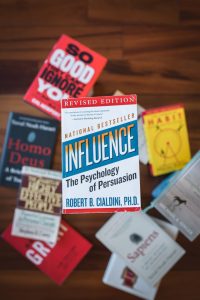Persuasion skills
The ability to persuade others is probably the most powerful communication tool available to us. Whilst its importance means that it has been studied since ancient times, only in the modern era has scientific research been possible. More recently, digital analysis of large volumes of data has become available. We aim to bring all of that to bear in advising and coaching clients.
Ancient Knowledge
Aristotle's famous 'Three Appeals'

These three, plus other forgotten appeals, give you all you need to be persuasive:
- Logos: Although the literal translation means ’words’, here it means the use of logic, reasons, and common sense. We help you to develop such arguments, supported by the best evidence that exists.
- Ethos: A good English meaning here is the use of ethical arguments, either because of the authority or credibility of the speaker (respect and trust) or moral duty (even if they cause damaging side-effects)
- Pathos: This most literally means the use of emotion in persuasion. Not irrational, but rational and often under-appreciated arguments including pleasure and happiness. Have you never decided to do something for fun?
- Aristotle and his community of Greek sophists also had other appeals that have been largely forgotten, for example Kairos (good timing), Mythos (a good and well-known story, even if not actually true), Nomos (customs and social norms, often unwritten) and Telos (deeper purpose or end goal).
Modern scientific research
We are fortunate to have shoulders to stand on in developing our knowledge of persuasion so that we can pass on what we learn and work out to clients. This includes what is now a very large body of good scientific experiments done around the word on Persuasion. Leaders in the field include Professors Richard E Petty, John Cacioppo, David Schumann, Robert Cialdini, Paul Eckman, and James Russell.
We review these sources of good knowledge, reflect on what they say in the real world, and bring that advice to bear for our clients.
Rhetorical tools
Whilst there is a ‘Science of Persuasion’, we have concluded that there is also an ‘Art of Persuasion’, and not just because any books have been written with this sort of title. No, our view on this is derived from observing and advising on acts of persuasion for well over 25 years and counting.
One part of this Art is the use of language. The construction of sets of words that might use facts, ethics or emotion to persuade, but which are not just plain recitals of sets of words. There is an elegance and beauty to a great persuasive case in the real world, and there is a set of tools out there that we can all learn to apply to the task. A spanner to turn a nut and a drill to make a hole. We have selected some 70 of the roughly 350 tools known to researchers that we think go far beyond intellectual curiosity and into the realms of truly impressive persuasiveness.
Many such tools hide in plain sight: metaphors, examples, anecdotes, counter-argument, tropes, ellipses… We have many more! The key thing is that we help client to apply these tools to become more persuasive. See our full rhetorical tools list here.
How we advise on Persuasion
That depends on what you are trying to do. Usually it’s to win business, sell a company, sell and idea, negotiate a deal or raise a fund.
We will take this knowledge and these tools and apply as needed. Often we’ll do this with the team embarking on said acts, aiming for real and significant results. We’ll brainstorm, critique, plays devil’s advocate, supply ideas. The good news is that this can be an enjoyable and positively life-changing process.

